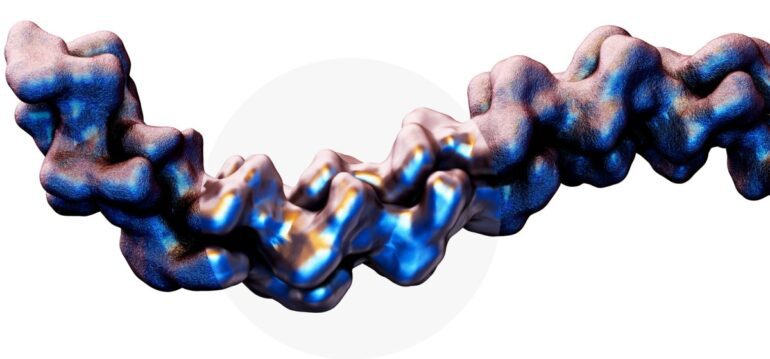TL;DR:
- Cambrium is pioneering the creation of designer proteins with a focus on sustainability and scalability.
- They have secured €11 million in funding to expand beyond their initial product, NovaColl, into structural proteins for personal care and fashion.
- NovaColl, a modified collagen derivative, outperforms natural collagen in stimulating production without harming animals.
- Cambrium leverages AI to digitally design proteins, prioritizing human needs and scalability.
- Their approach focuses on high-value, low-volume industries such as personal care and textiles.
- European public funding has supported Cambrium’s capital-efficient development.
- Cambrium’s innovations promise to reshape industries and redefine possibilities in biotechnology.
Main AI News:
Nature has perfected its creations over billions of years, but there’s always room for innovation. Cambrium, a pioneering company in the biotech industry, is on a mission to create designer proteins that mimic nature’s wonders while being sustainable, scalable, and entirely vegan. With the aid of AI technology, Cambrium is reshaping the future of protein engineering.
Raising €11 million (approximately $11.6 million) in funding, Cambrium is expanding its operations beyond its initial proof of concept, NovaColl – a customized collagen derivative. Their vision extends to developing a new range of structural proteins with applications in personal care and fashion, redefining the standards of beauty and well-being.
Collagen, the most abundant protein in the human body, is a prime example of nature’s ingenuity. However, sourcing collagen from animals involved in the meat processing industry raises ethical concerns. Furthermore, natural collagen’s large molecular size limits its ability to penetrate the skin effectively. Cambrium’s early-stage breakthrough involved isolating the crucial region of the protein responsible for its effectiveness and modifying it for efficient bioreactor-based production. The result? NovaColl, a smaller, more potent molecule that stimulates collagen production without the need for organ sacrifice.
CEO and founder Mitchell Duffy emphasizes Cambrium’s focus on “structural” proteins, valued for their physical properties rather than their medicinal or enzymatic uses. Silk serves as a prime example, prized for its structural qualities rather than its origin from silkworms. Duffy envisions the possibility of replicating these properties in a more sustainable, cost-effective manner, all while remaining vegan-friendly.
Cambrium’s unique approach allows it to prioritize structure and function over rigid amino acid sequences. By digitally designing proteins, they can optimize them for human needs and scalability. Unlike many companies that scale up existing proteins, Cambrium’s strategy is to design proteins that are inherently scalable from the outset.
The integration of AI is central to Cambrium’s innovative process. Their proprietary programming language allows them to manipulate proteins like words in a sentence, creating new molecular structures. This generative AI model has been trained on extensive data, enabling Cambrium to revolutionize protein engineering.
While Cambrium’s work encompasses both modifying existing proteins and designing entirely new ones, its primary focus is on high-value, low-volume industries like personal care. The low minimum quantities, high demand, and openness to innovation make this sector an ideal starting point. Textile treatments, including those used in leather, are also within their purview, promising more sustainable alternatives.
Essential Capital led Cambrium’s seed funding round, joined by SNR, Valor Equity Partners, HOF Capital, and Merantix. European public funding has played a significant role in Cambrium’s journey, enabling them to experiment and develop their processes efficiently, without excessive reliance on venture capital.
As NovaColl begins shipping to customers for real-world testing, Cambrium’s next innovations remain shrouded in secrecy. However, with this substantial funding injection, their operations are poised for rapid expansion, promising a future where designer proteins reshape industries and redefine what’s possible in biotechnology. Stay tuned for more updates as Cambrium’s journey unfolds.
Conclusion:
Cambrium’s groundbreaking approach to protein design, fueled by AI technology and sustainability, signifies a significant shift in the biotech market. By prioritizing structural proteins and scalable design, they are poised to disrupt industries like personal care and textiles. Their success, backed by substantial funding and efficient processes, heralds a future where designer proteins redefine the boundaries of possibility in biotechnology.

